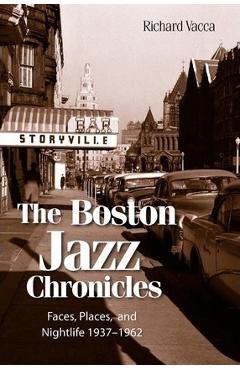
There has always been more to music in Boston than the Boston Symphony Orchestra.
Jazz, for example, dates to the early 1900s, but it was in the 1940s and 1950s that it truly sparkled.
The Boston Jazz Chronicles: Faces, Places, and Nightlife 1937-1962 is the first book to document that citys active jazz scene at mid-century.
Boston jazz came into its own during the World War II years, when the big bands supplied America with its popular music, and Bostons Charlie and Cy Shribman were among the kingmakers of the big-band era.
The city produced such talents as pianist and bandleader Sabby Lewis, the multi-instrumentalist Ray Perry, and bassist Lloyd Trotman.
The scene benefited from the extended wartime presence of established stars, including trumpeter Frankie Newton and trombonist Vic Dickenson, and from the start of a Sunday afternoon jam session tradition that brought the nations best jazzmen into regular contact with local players.
There were opportunities for musicians, particularly young musicians, to gain valuable experience by filling in for the older men serving in the military.
The end of the war introduced new jazz sounds to Boston, and reintroduced a few older ones as well.
Alongside those musicians like Lewis still playing swing, there were others looking to the past for inspiration, sparking a Dixieland revival, and still others looking forward, spreading the new sound of bebop.
There were big-band survivors in downsized groups playing jump blues, and others organizing new big bands along modern lines.
The end of the war also brought a surge of talented musicians, many of them veterans and beneficiaries of the GI Bill.
They were attracted by the citys music conservatories and the new Schillinger House, soon to be renamed the Berklee School of Music.
Boston became a destination for musicians seeking new musical direction.
Here they joined with Bostons own contingent of formidable musicians to form a new, more modern scene, led by such luminaries as Jaki Byard, Joe Gordon, Nat Pierce, Charlie Mariano, Herb Pomeroy, Sam Rivers, Alan Dawson, and Dick Twardzik.
They would carry Boston jazz to a creative peak in the mid-to-late 1950s that still remains unequaled.
The music was splendid, but there was more.
Boston was home to influential jazz journalists George Frazier and Nat Hentoff; Berklee College of Music founder Lawrence Berk; Father Norman OConnor, the Jazz Priest; record company executive and prod There has always been more to m.
Mark Andrews
111.32 Lei
Brian Morton
195.30 Lei
John Malkin
191.25 Lei
Scott W. Allen
112.79 Lei
Jonathan Cott
156.19 Lei
Clark Humphrey
139.50 Lei
Kiana Fitzgerald
156.24 Lei
Glen E. Friedman
214.20 Lei
Richard Morton Jack
222.92 Lei
Robert Palmer
100.44 Lei
Clemency Burton-Hill
161.77 Lei